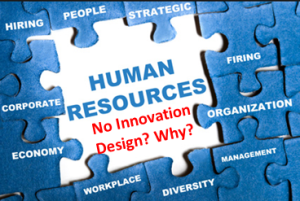 The management of human resource (HRM) needs to be replaced with the management of human creativity and ingenuity, as this is the triggering point to innovation success and delivering longer-term sustaining success.
The management of human resource (HRM) needs to be replaced with the management of human creativity and ingenuity, as this is the triggering point to innovation success and delivering longer-term sustaining success.
The critical role of innovation is without question needed for the future growth, wealth creation and organisations potential survival.
Who is to drive the human change required here within our business organisations?
I believe within our human resource groups they must provide the people solution to building innovation capacity, they should contribute to providing lasting design impact and central engagement role in building innovation into the core fabric of the organisation. They become central to helping deliver, distinctive, radical, even game-changing innovation and that needs clear, distinct capabilities, capacities and competencies to be design into and innovation management system.
Those in human resources should be good facilitators, the catalysts of leading change required to make innovation more centrally the core of our organisations. They need to play a pivotal role in the needs to facilitate and underpin top-line growth with establishing the organisation design and deliver the resources for bottom-line impact, determining why people are the essential essence of innovation and how they are going to deliver this ‘resource’ into the innovative mix.
HR needs to make sure all the necessary structure and appropriate resources are designed into the organization, in every activity for making innovation the ‘way of life’ One that it is well understood as corporately vital, fully integrated in outcomes, that have definitive metric and measurement designed in ,resources well support and consistently trained and ensuring there is this ongoing, sustaining enhancing in building the innovation capabilities and capacities. They can help deliver the dynamics needed in innovation.
To take innovation into the organisations core needs HR
If HR took innovation into the core of organisational design, then a mandate for each person becomes a required necessity so as is to get fully involved and engaged in innovation activity. An essential part of this is to ensure the valuable experience is built-in, on an ongoing basis, that enhances the desired capabilities for the future of the organisation and themselves, to grow in confidence and experiences. If innovation is seen as core, you begin to break down the present barriers and mindsets that restrict innovation today by current behaviours, blocking innovating activity or placing constraints in allocating the required resources to ‘allow’ innovation to flourish.
HR can find clear ways to foster innovation in more open ways, it can cut across borders, discourage silo’s and promote collaboration. HR can become a powerful connector, platform provider for building networks, relationships and being a key component to building the learning that innovation requires.
Future leaders will be different
Future leaders need to emerge not from managing existing assets well but in managing in increased uncertainties, being more adaptive, agile and responsive to changing needs. CEO’s are demanding creativity, flexibility and speed to size up, quickly seize and grab breaking opportunity. These newer demanded skills come from knowing how and where to go, to be well-connected across platforms of knowledge, having close client connectivity and being able to extract all the essentials, resources and commitments to enable execution. Adaptability to constant change has a very different mindset to be developed in our future leaders.
HR- being on the cutting edge of innovation
HR does need to step up and define a new mandate for innovation and become essential in delivering a new cutting edge to innovation. If innovation is ever going to achieve a core place within organisations it has to be deliberately designed in for skill definitions, leadership development and knowledge and experiences gained. HR needs to cultivate, mobilise and capitalise the future design of innovation and then deliver this as part of the top team within organisations.
If this means employing external mentors, coaches and innovation expertise to bring HR up to speed, to help them to deepen their knowledge and the people connection, then it is well worth it. Care, of course, is in finding those that have the depth and breadth of required experience to work alongside them, to build up and transfer the appropriate understanding of those innovation needs.
I believe HR can determine where the true innovation premium lies, in the people and set about ensuring that the daily fabric of the organisation becomes innovation as a new core, well supported and constructed to deliver sustaining invention, creativity and innovative solutions to aid the growth organisations clearly need today.
HR clearly needs to take on a more pivotal role for innovation.
They can become central for a lasting place to plan and significantly contribute to building innovation capability and capacity, or stay more passive and operate always in the outer periphery of today’s business needs and watch as this role diminishes in the future corporate relevance, as it is one where innovation does need to play, to become core.
Building capabilities and capacities for innovation are essential to our organisation’s future well-being and for me, the HR groups within our organisations do need to step up and become far more engaged in constructing this innovation design through building the capacities needed.
Can HR step up to the challenge of laying out a clear organisations design for innovation and then deliver all the parts this means?